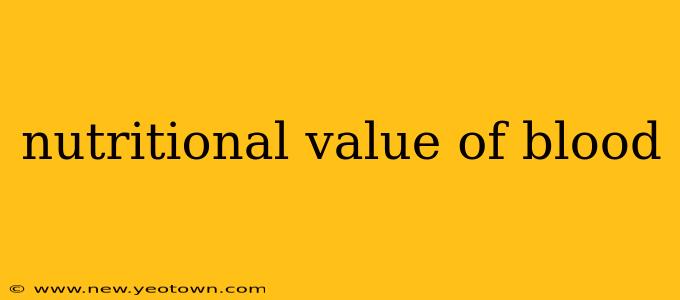We often think of food as the primary source of nutrients, overlooking a vital fluid coursing through our veins: blood. While we don't consume blood in the same way we eat a steak or a salad, understanding its nutritional composition offers fascinating insights into our bodies' intricate workings and the importance of maintaining healthy blood. This isn't about drinking blood, mind you – it's about appreciating the role blood plays in delivering essential nutrients throughout our system.
What Nutrients Does Blood Contain?
Blood isn't a single, homogeneous substance. It's a complex mixture, primarily composed of plasma, red blood cells, white blood cells, and platelets. Each component contributes to its overall nutritional profile, though we can't directly access and utilize these nutrients in the same way we do with food. The key takeaway is that the nutrients in blood are vital to the body's function.
The plasma, the liquid component, carries various nutrients absorbed from the digestive system, including:
- Proteins: Albumin, globulins, and fibrinogen are crucial for maintaining blood pressure, transporting hormones, and clotting.
- Electrolytes: Sodium, potassium, chloride, and calcium are vital for nerve function, muscle contraction, and fluid balance.
- Glucose: The primary energy source for cells.
- Vitamins and Minerals: Blood carries a spectrum of vitamins (like vitamin B12, crucial for red blood cell production) and minerals (like iron, a key component of hemoglobin).
- Lipids: Fats and cholesterol, essential for hormone production and cell membrane structure.
Red blood cells, the most abundant component, contain hemoglobin, a protein rich in iron that carries oxygen throughout the body. White blood cells are part of the immune system, protecting against infection. Platelets aid in blood clotting.
What are the Benefits of Healthy Blood?
The nutritional value of blood isn't about consumption but about the consequences of healthy blood composition. Maintaining optimal blood health directly impacts overall well-being:
- Efficient Oxygen Transport: Healthy red blood cells, rich in iron-containing hemoglobin, ensure sufficient oxygen delivery to tissues and organs, preventing fatigue and supporting optimal cellular function.
- Strong Immunity: Adequate white blood cells, along with sufficient vitamins and minerals, contribute to a robust immune system, protecting against infections and diseases.
- Effective Nutrient Distribution: Blood acts as a delivery system, transporting essential nutrients to every cell in the body. Healthy blood ensures these nutrients reach their destination effectively.
- Stable Blood Pressure and Clotting: The proteins and electrolytes in plasma contribute to stable blood pressure and efficient blood clotting mechanisms.
Is Blood a Good Source of Nutrients for Consumption?
No. While blood contains nutrients, it's not a suitable or safe source of nutrition for human consumption. The risks associated with consuming blood significantly outweigh any potential nutritional benefits. This includes the potential for infections, bloodborne diseases, and other health complications.
What Foods Help Improve Blood Health?
Focusing on a diet rich in iron, vitamin B12, folate, and other essential nutrients is the best way to ensure your blood is healthy and functioning optimally. Foods like leafy greens, red meat (in moderation), legumes, and fortified cereals are excellent sources of these vital components. Consult a healthcare professional or registered dietitian for personalized dietary advice.
How Can I Check the Health of My Blood?
Regular blood tests are crucial for monitoring blood health. These tests assess various parameters, including complete blood counts (CBC), which evaluate red blood cell count, hemoglobin levels, and white blood cell count. Your doctor can recommend the appropriate tests and interpret the results.
What are the Signs of Poor Blood Health?
Symptoms of poor blood health can vary depending on the underlying cause but might include extreme fatigue, weakness, pale skin, shortness of breath, dizziness, and frequent infections. If you experience any of these symptoms, consult your doctor promptly.
In conclusion, while we don't directly consume blood for its nutritional content, understanding its composition highlights the crucial role it plays in delivering essential nutrients and maintaining overall health. Focusing on a balanced diet and regular checkups are key to ensuring your blood remains a healthy, efficient life-sustaining fluid.

